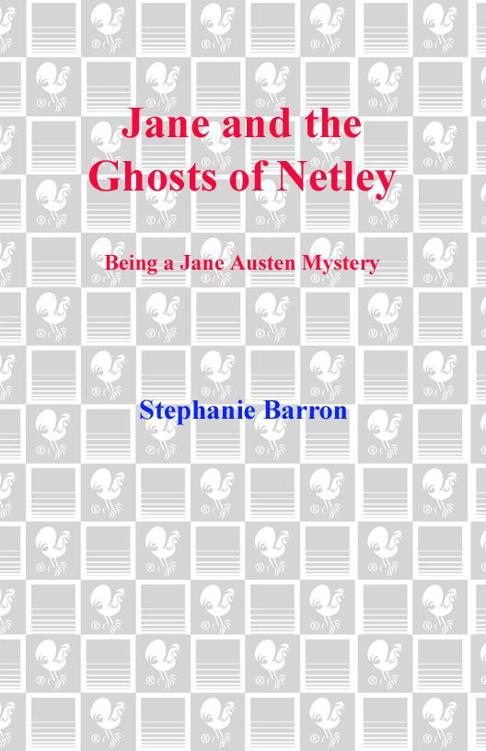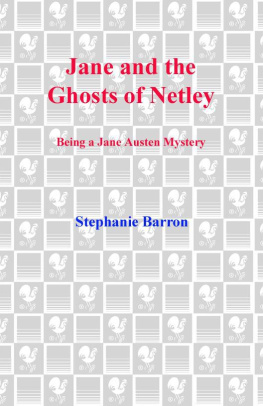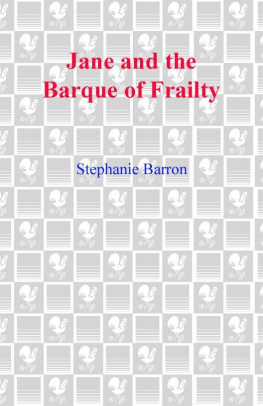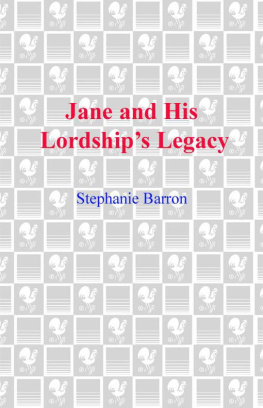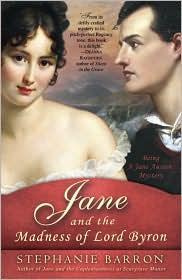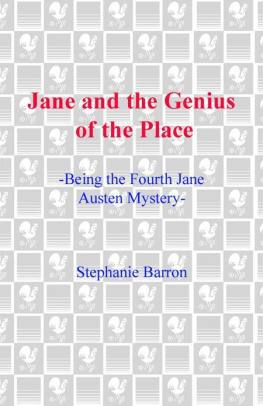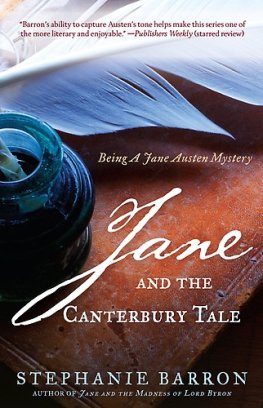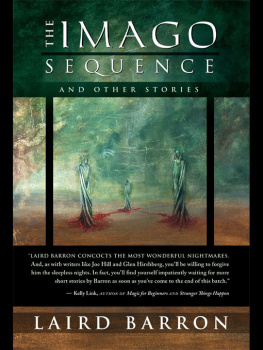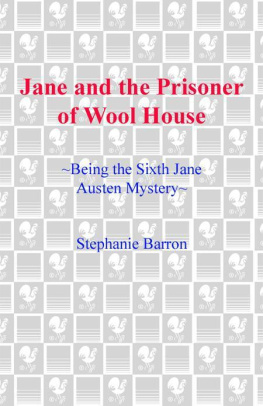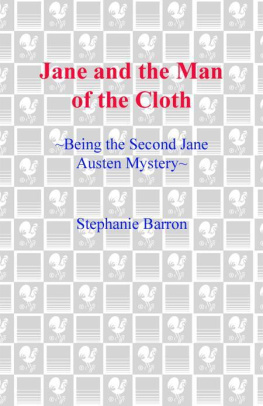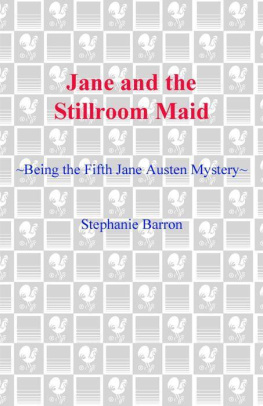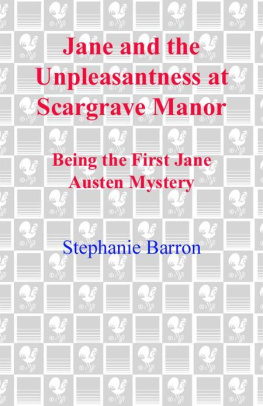Annotation
A wonderfully intricate plot full of espionage and intrigue.. The Austen voice, both humorous and fanciful, with shades of Northanger Abbey, rings true as always.
Stephanie Barron
Jane and the Ghosts of Netley
Being the Seventh Jane Austen Mystery
For Phil and Linda
and
for my uncle Frank J. MacEntee, S.J.
Thanks for all the pilfered stories.
Chapter 1
Bare Ruin'd Choirs
Tuesday, 25 October 1808
Castle Square, Southampton
There are few prospects so replete with romantic possibility -- so entirely suited to a soul trembling in morbid awe -- as the ruins of an English abbey. Picture, if you will, the tumbled stones where once a tonsured friar muttered matins; the echoing coruscation of the cloister, now opened to the sky; the soaring architraves of Gothick stone that oppress one's soul as with the weight of tombs. Vanished incense curling at the nostril -- the haunting memory of chanted prayer, sonorous and unintelligible to an ear untrained in Latin -- the ghostly tolling of a bell whose clapper is muted now forever! Oh, to walk in such a place under the chill of moonlight, of a summer evening, when the air off the Solent might stir the dead to speak! In such an hour I could imagine myself a heroine straight from Mrs. Radcliffe's pen: the white train of my gown sweeping over the ancient stones, my shadow but a wraith before me, and all the world suspended in silence between the storied past and the prosaic present.
Engaging as such visions must be, I have never ventured to Netley Abbey -- for it is of Netley I would speak, it being the closest object to a romantic ruin we possess in Southampton -- in anything but the broadest day. I am far too sensible a lady to linger in such a deserted place, with the darkling wood at my back and the sea to the fore, when the comfort of a home fire beckons. Thus we find the abyss that falls between the fancies of horrid novels, and the habits of those who read them.
"Aunt Jane!"
"Yes, George?" I glanced towards the bow, where my two nephews, George and Edward, surveyed the massive face of Netley Castle as it rose on the port side of the small skiff.
"Why do they call that place a castle, Aunt? It looks nothing like."
" 'Tis a Solent fort, you young nubbins," grunted Mr. Hawkins, our seafaring guide. "Built in King Henry's time, when the Abbey lands were taken. In a prime position for defending the Water, it is; they ought never to have spiked those guns."
"But we have Portsmouth at the Solent mouth, Mr. Hawkins," Edward observed, "and must trust to the entire force of the Navy to preserve us against the threat from France." The elder of the two boys -- fourteen to George's thirteen -- Edward prided himself on his cool intelligence. As my brother's heir, he was wont to assume the attitudes of a young man of fortune.
My nephews had come to me lately from Steventon, after a brief visit to my brother James -- a visit that I am certain will live forever in their youthful memories as the most mournful of their experience. I say this without intending a slight upon the benevolence of my eldest brother, nor of his insipid and cheeseparing wife; for the tragedy that overtook our Edward and George was entirely due to Providence. Nearly a fortnight has passed since a messenger out of Kent conveyed the dreadful intelligence: how Elizabeth Austen, the boys' mother and mistress of my brother Edward's fine estate at Godmersham, had retired after dinner only to fall dead of a sudden fit. Elizabeth! So elegant and charming, despite her numerous progeny; Elizabeth, unbowed as it seemed by the birth of her eleventh child in the last days of September. The surgeon could make nothing of the case; he declared it to be improbable; but dead our Lizzy was, despite the surgeon's protestations, and buried she has been a week since, in the small Norman church of St. Lawrence's where I attended her so often to Sunday service.
I suspect that too much breeding is at the heart of the trouble -- but too much breeding is the lot of all women who marry young, particularly when they are so fortunate as to make a love-match. Elizabeth Bridges, third daughter of a baronet, was but eighteen when she wed, and only five-and-thirty when she passed from this life. With her strength of character, she ought to have lived to be eighty.
It remains, now, for the rest of us to comfort her bereaved family as best we may. My sister Cassandra, who went into Kent for Elizabeth's lying-in, shall remain at Godmersham throughout the winter. Dear Neddie bears the affliction with a mixture of Christian resignation and wild despair. My niece Fanny, who at fifteen is grown so much in form and substance as to seem almost another sister, must shoulder the burden of managing the younger children, for the household is without a governess. There is some talk of sending the little girls away to school, that they might not brood upon the loss of their mamma -- but I cannot like the scheme, having nearly died when banished as a child to a young ladies' seminary. The elder boys, Edward and George, endured their visit to brother James at Steventon and appeared -- chilled to the bone with riding next to Mr. Wise, the coachman -- on Saturday. They are bound for their school in Winchester on the morrow. Their happiness has been entirely in my keeping during this short sojourn in Southampton. I have embraced the duty with a will, for they are such taking lads, and the blight of grief sits heavily upon them. They forget their cares for a time in playing at spillikins, or fashioning paper boats to bombard with horse chestnuts. The evening hours, when dark descends and memory returns, are harder to sustain. George has proved a restless sleeper, crying aloud in a manner more suited to a child half his age. He will be roundly abused for weakness upon his return to school, if he does not take care.
My mother, I own, finds the boys' spirits to have a shattering effect upon her nerves, which invariably fail her in moments of family crisis. No matter how diligently Edward might twist himself about in our reading chairs, engrossed in The Lake of Killarney, or George lose a morning in attempting to sketch a ship of the line, their exuberance will drive my mother to her bedchamber well before the dinner hour, to take her evening meal upon a tray.
Yesterday, I carried the boys up the River Itchen in Mr. Hawkins's skiff, and stopped to examine a seventy-four that is presently building in the dockyard there.1 The place was a bustle of activity -- scaffolding and labourers vied for place in a chaos of scrap wood and iron tools -- and left to myself, I should not have dreamt of disturbing them. But under the chaperonage of Mr. Hawkins, a notorious tar known to all in Southampton as the Bosun's Mate, we received a ready welcome from the shipwright. Mr. Dixon is a hearty fellow of mature years and bright blue eyes who takes great pride in his work.
"Miss Austen, d'ye say?" he enquired sharply over our introduction. "Not any relation to Captain Francis Austen?"
"I am his sister, sir."
"Excellent fellow! A true fighting captain, or I miss my mark! And no blubberhead neither. You won't find Frank Austen playing cat-and-mouse with Boney; goes straight at 'em, in the manner of dear old Nelson."
"That is certainly my brother's philosophy. You are acquainted with him, I collect?"
"Supplied the Cap'n with carronades last summer, as he could not secure them in Portsmouth,"
